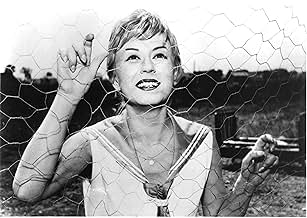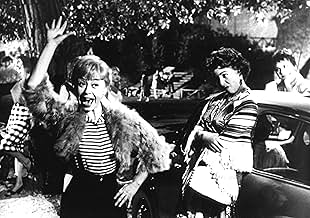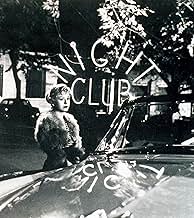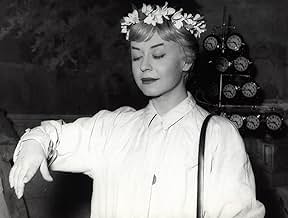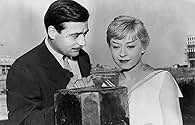NOTE IMDb
8,1/10
55 k
MA NOTE
Une prostituée erre dans les rues de Rome à la recherche du véritable amour mais ne trouve que le chagrin.Une prostituée erre dans les rues de Rome à la recherche du véritable amour mais ne trouve que le chagrin.Une prostituée erre dans les rues de Rome à la recherche du véritable amour mais ne trouve que le chagrin.
- Réalisation
- Scénario
- Casting principal
- Récompensé par 1 Oscar
- 17 victoires et 7 nominations au total
François Périer
- Oscar D'Onofrio
- (as François Perier)
Franco Balducci
- Spectator on the Stage of the Cinema
- (non crédité)
Ciccio Barbi
- Man on the Stage
- (non crédité)
Luciano Bonanni
- Pascello
- (non crédité)
Loretta Capitoli
- Rosy
- (non crédité)
Amerigo Castrighella
- Hypnotised man
- (non crédité)
Leo Catozzo
- The Man with the Sack
- (non crédité)
Dominique Delouche
- Priest with the Flag
- (non crédité)
Avis à la une
...alongside La Dolce Vita, 8 1/2 and Amarcord. Fellini's films are not for everybody perhaps, but I admire them how well made made and directed they are, some of them like Amarcord and the peacock in the snow have breathtakingly beautiful images that stay long in the mind, for his choices in composers and actors, for his deliberately paced and sometimes ambitious stories(8 1/2 is especially true of this) and also that the characters are not always what they seem at first glance. Nights of Cabiria I have seen before criticised as grating, sentimental and self-indulgent(the latter being a criticism of Fellini's films in general and him also actually), and while I am understanding, I personally don't agree.
I find Nights of Cabiria to be one of his accessible films, and along with La Strada also his most moving. Again it is incredibly well made, with beautiful scenery and cinematography. The images are again very memorable, and done with much emotional resonance, the best of which being the ending which is both tragic and uplifting. Fellini's direction is superb, the personal nostalgia that is apparent in all his films is here and you do identify with the story and the titular character. The music has much beauty and nostalgic charm, while the story perfectly tells of the sheer happiness and then tearful sorrow of unfortunate Cabiria's life. Cabiria, the titular character, is one you can identify with immediately, feeling pity and also her conflicting emotions as she tries to remain positive even in the face of adversity. Giulietta Masina gives a bravura performance, her face and eyes are beautifully expressive and she is just heart-breaking. Francois Perier also shines as the stranger who makes the offer that is almost too good to be true.
Overall, a truly beautiful film and one of Fellini's best, certainly one of my favourites as well. 10/10 Bethany Cox
I find Nights of Cabiria to be one of his accessible films, and along with La Strada also his most moving. Again it is incredibly well made, with beautiful scenery and cinematography. The images are again very memorable, and done with much emotional resonance, the best of which being the ending which is both tragic and uplifting. Fellini's direction is superb, the personal nostalgia that is apparent in all his films is here and you do identify with the story and the titular character. The music has much beauty and nostalgic charm, while the story perfectly tells of the sheer happiness and then tearful sorrow of unfortunate Cabiria's life. Cabiria, the titular character, is one you can identify with immediately, feeling pity and also her conflicting emotions as she tries to remain positive even in the face of adversity. Giulietta Masina gives a bravura performance, her face and eyes are beautifully expressive and she is just heart-breaking. Francois Perier also shines as the stranger who makes the offer that is almost too good to be true.
Overall, a truly beautiful film and one of Fellini's best, certainly one of my favourites as well. 10/10 Bethany Cox
10zetes
This is one of the most perfect films ever committed to celluloid. It involved me more than at least 99% of other films I've seen, and the main character, Cabiria, is a character to cherish and love forever (of course, we who have seen La Strada are already partly familiar with the character). I've hardly ever cared more about a character, and even after only five minutes into the film, I wanted so desperately to protect her. Giulietta Masina is so masterful in her performance, and Federico Fellini, her husband, is as masterful in his direction. I did not believe that they could match their success with La Strada, but, in fact, they succeeded in surpassing it. Bravo. 10/10. One of the best films ever made, plain and simple.
I almost turned this film off. I'm so glad I stayed with it. It's one of the best films I've seen. Cabiria, the street prostitute, is not sympathetic. She's rough, vulgar, not very attractive, a showoff, loud, proud, inelegant. I just didn't feel anything for her character at the beginning. But Fellini must have been reading my mind. He purposefully played it that way to draw the viewer in.
The streets of Rome are unforgiving and harsh for a prostitute. There are those who sleep in caves and in the archways. Cabiria braggingly says, "I've got my own house...here's one girl who's never slept under the arches. Well, maybe once. Twice maybe." By the end of the film I was completely hooked by her charm, desire, and hope. For hope is what keeps Cabiria going. A great film.
The streets of Rome are unforgiving and harsh for a prostitute. There are those who sleep in caves and in the archways. Cabiria braggingly says, "I've got my own house...here's one girl who's never slept under the arches. Well, maybe once. Twice maybe." By the end of the film I was completely hooked by her charm, desire, and hope. For hope is what keeps Cabiria going. A great film.
I would not argue that there could be better films made before and after Cabiria. Perhaps. But there never will be another "Nights of Cabiria" - the last Fellini's film with the linear structure, his third and the most successful collaboration with his actress wife, Giulietta Masina, his immortal love letter to her. Of all his characters, Fellini once said, Cabiria was the only one he was still worried about. Of all the characters, I've seen in the films, Cabiria is the one I often think about - what ever happened to her? Did she survive? Was she able to find love?
I've never seen the face so alive, changing its expression every moment. If the face is the soul's mirror, Cabiria's (Masina's) face reflects her every single emotion and how effortlessly she goes from bitter cynicism to wistful yearning, from despair to hope, from tears to smile. While there's life there's hope. As long as Cabiria smiles in the end of this tragicomic masterpiece, there is hope for all of us.
I've never seen the face so alive, changing its expression every moment. If the face is the soul's mirror, Cabiria's (Masina's) face reflects her every single emotion and how effortlessly she goes from bitter cynicism to wistful yearning, from despair to hope, from tears to smile. While there's life there's hope. As long as Cabiria smiles in the end of this tragicomic masterpiece, there is hope for all of us.
My friends went to see The Queen last night - I was too tired and decided to go back home. I put in the DVD and got into bed figuring I would watch an half hour or so and fall asleep. At the end of nearly 2 hours, I was sitting up straight, wide awake, awestruck at the genius in the direction and acting. This is cinema at its finest. I have seen La Strada before and I now rank Fellini's earlier work as among my all time favorites (along with Ozu.) Masina's tearful smile at the camera at the end is pure magic - so much dignity and hope captured in a single second. Her performance throughout the movie was a revelation - she got innocent hope and graceful charm to shine through her foul-mouthed vulgar acting character. I simultaneously cared and despaired for her - this movie pulled me in like no recent Hollywood movie has for a long long time.
Le saviez-vous
- AnecdotesFederico Fellini cast film editor Leo Catozzo as the "man with the sack" and wanted to keep that sequence in the release print over the objections of producer Dino De Laurentiis. De Laurentiis thought the scene slowed the film down and finally resorted to stealing the scene from the editing room. According to DeLaurentiis, about 5-7 years after its original release, Fellini rang him and begged to get the scene back, so he could restore it. As the movie had now achieved a classic status, the producer agreed.
- GaffesWhen the pilgrims pass Cabiria in the night, there is a closeup of the naked feet of the women. On the following wide shot, the women are wearing shoes.
- Citations
Maria 'Cabiria' Ceccarelli: [in Italian]
[to Oscar]
Maria 'Cabiria' Ceccarelli: Guess there's some justice in the world. You suffer, you go through hell. Then happiness comes along or everyone.
- Versions alternativesNights of Cabiria has been available in videos in the original version. The Rialto Pictures 1998 version, released in theaters in 1998, restores a scene showing a mystery man with a sack delivering food and blankets to people sheltered in holes. The 1998 version restored picture and sound, has a new translation, and is available from The Criterion Collection (DVD) and Homevision Cinema (DVD). Update 2019: The film has been restored in 4K from the interpositive and is now available for the first time on home video in a Blu Ray version that is comparable to a good 35mm print.
- ConnexionsFeatured in Decoy: Ladies Man (1958)
Meilleurs choix
Connectez-vous pour évaluer et suivre la liste de favoris afin de recevoir des recommandations personnalisées
Détails
- Date de sortie
- Pays d’origine
- Langues
- Aussi connu sous le nom de
- Nights of Cabiria
- Lieux de tournage
- Castel Gandolfo, Rome, Lazio, Italie(Exterior)
- Sociétés de production
- Voir plus de crédits d'entreprise sur IMDbPro
Box-office
- Montant brut aux États-Unis et au Canada
- 766 530 $US
- Week-end de sortie aux États-Unis et au Canada
- 38 988 $US
- 5 juil. 1998
- Montant brut mondial
- 770 764 $US
- Durée1 heure 50 minutes
- Couleur
- Rapport de forme
- 1.37 : 1
Contribuer à cette page
Suggérer une modification ou ajouter du contenu manquant

Lacune principale
By what name was Les nuits de Cabiria (1957) officially released in India in English?
Répondre

